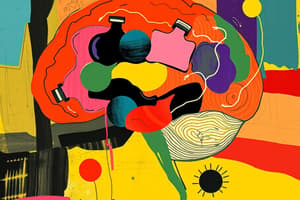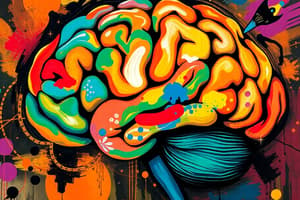Podcast
Questions and Answers
Which type of memory is also known as working memory?
Which type of memory is also known as working memory?
- Sensory Memory (correct)
- Episodic Memory
- Long-term Memory
- Short-term Memory
What are the two types of long-term memory?
What are the two types of long-term memory?
Episodic and Semantic
Semantic memory is derived from Episodic memory.
Semantic memory is derived from Episodic memory.
True (A)
The model that represents relationships between bits of information is called a ____.
The model that represents relationships between bits of information is called a ____.
What are the two types of errors in skill acquisition?
What are the two types of errors in skill acquisition?
Which theory states that emotion is our interpretation of a physiological response to stimuli?
Which theory states that emotion is our interpretation of a physiological response to stimuli?
Information moves from short-term memory to ____ through rehearsal.
Information moves from short-term memory to ____ through rehearsal.
What is the process of finding a solution to unfamiliar tasks using knowledge known as?
What is the process of finding a solution to unfamiliar tasks using knowledge known as?
Proactive inhibition is when new information replaces old information.
Proactive inhibition is when new information replaces old information.
What is the effect of positive affect on problem-solving?
What is the effect of positive affect on problem-solving?
Flashcards are hidden until you start studying
Study Notes
Information Stored in Memory
- Memory consists of three types: sensory, short-term, and long-term.
Sensory Memory
- Known as working memory; facilitates temporary storage of stimuli.
- Iconic memory focuses on visual stimuli.
- Echoic memory is dedicated to auditory stimuli.
- Haptic memory pertains to tactile sensations.
Short-Term Memory
- Acts as a scratch pad for immediate recall.
- Access time is rapid at approximately 70 milliseconds.
- Information decays quickly, within around 200 milliseconds.
Long-Term Memory
- Serves as a comprehensive repository for extensive knowledge.
- Access and decay rates are slower compared to short-term memory.
- Capacity is vast, often considered unlimited.
Types of Long-Term Memory
- Episodic Memory: Memory of personal events in a sequential manner.
- Semantic Memory: Memory of facts, concepts, and skills, which derives from episodic memory.
Semantic Memory Structure
- Facilitates information access and reflects relationships among data.
- Supports inference by allowing conclusions based on reasoning.
Models of Semantic Memory
- Semantic Network Model: Conceptualizes inheritance from parent nodes to child nodes, depicting precise relationships and supporting inference.
- Frames: Organize information into data structures, where slots represent values.
- Scripts: Provide models of typical scenarios for context interpretation.
- Production Rules: Represents procedural knowledge through condition/action rules that dictate actions based on conditions.
Long-Term Memory Storage and Retrieval
- Rehearsal: Essential for transferring information from short-term to long-term memory.
- Total Time Hypothesis: Retention is proportional to rehearsal duration.
- Distribution of Practice Effect: Enhanced by spreading learning sessions over time.
Forgetting in Long-Term Memory
- Decay: Gradual loss of information over time.
- Interference:
- Retroactive interference occurs when new information replaces old.
- Proactive inhibition can hinder the recall of new data due to old data.
Retrieval Methods
- Recall: Reproducing information aided by cues like imagery.
- Recognition: Identifying previously seen information; simpler than recall.
Processed Information Applications
- Information is processed through reasoning, problem-solving, skill acquisition, and handling errors.
Reasoning Types
- Deductive Reasoning: Derives conclusions from given premises; highlights potential conflicts between truth and logical validity.
- Inductive Reasoning: Generalizes from known cases to unknown instances; involves assumptions.
- Abductive Reasoning: Infers causes from events; may lead to inaccurate explanations.
Problem-Solving Theories
- Gestalt Theory: Sees problem-solving as a creative process encompassing insight.
- Problem Space Theory: Frames problem-solving as generating states within legal boundaries of human information processing.
Skill Acquisition
- Characterized by chunking which leads to effective information structuring.
Types of Errors
- Slips: Mistakes made despite the right intention; often due to poor execution.
- Mistakes: Result from misinterpretation; stem from incorrect intentions.
Emotion and Cognition
- Emotion encompasses both cognitive and physical reactions to stimuli, affecting responses to situations.
- Positive Affect: Enhances creative problem-solving capabilities.
- Negative Affect: Often narrows thinking and hinders performance on tasks.
Theories of Emotion
- James-Lange Theory: Suggests emotional interpretation arises from physiological responses.
- Cannon’s Theory: Proposes that physiological responses occur as a reaction to stimuli.
- Schachter-Singer Theory: Emotion involves evaluating physiological responses within the context of the entire situation.
Studying That Suits You
Use AI to generate personalized quizzes and flashcards to suit your learning preferences.




